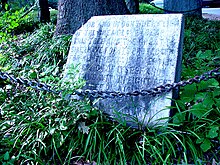
William H. Jackson
“For and in consideration of the great love I bear this tree and the great desire I have for its protection for all time, I convey entire possession of itself and all land within eight feet of the tree on all sides.”
The Oak that Owned Itself
Never mind that the story is not even true: a half lie of eighty years. Never mind that the shy hero—or rather his sappy descendant—won’t say a word in self-defense. Never mind (if you don’t mind) that the law, dementia justica, in its usual democratic fashion, has stepped out—a true policeman—and forbidden it. Man needs his heroes; his mythic heroes as well.
Odysseus and the clumsy, blinded cyclops, his one great visionary eye a splat of blood. Moses and the firey bush, red with leaf-licking flame, yet forever unconsumed. Jesus and his cursed, out-of-season fig tree that won’t bear fruit. There is truth here: human greatness nonhumans inspire. But so much the better the greatness the more nonhuman the inspirer.
And why not a tree, particularly a large oak that tumbles its branches 90 feet forward into the vault of the sky. Why not a graft-sappling, born-again descendant of bark and body?
Ricardo sat up.
Behind him, fiendishly, the bermuda reached over the edge of the curb, the blades yellowed like an old man’s fingers, grabbing at pavement as if trying to strangle the neck of the roadside, which maliciously halted its natural potential. To his right—stones, fence, plaque—all the words given finally, if not grudgingly, by man to the tree. Oak-invisible words! But invisible to the oak or not, to Ricardo it seemed that the tree was somehow a symbol of life’s fight to own itself. Life struggling, valiantly even, to control its own destiny.
Perhaps it had once: it did not now.
Ricardo went over the story in his mind, then turned about in a slow arc. Which house was the benefactor’s boyhood home, he wondered? Behind him the bermuda, shackled like tangled messy worms, stillborn, sicky yellow.
As soon as he saw it, something frightened him.
Why fear all of a sudden? Nothing was ominous about the house, itself a traditional Victorian cottage, white-painted. Very benign. Was it the clouds, the way they side-shifted, full of silence? A scythe-stroke movement as if in one blow to harvest the bermuda, the trees, the house itself.
No, not the clouds.
But this story is not really about the tree. What is it about? Human life, perhaps, or the human failure to own ourselves, our own lives. But how is a story like this told? Only circumspectly. And then the tree there, in background, pointing at our meaning, inhuman hero.
How is it that we can grow up and work and live and then our life is over, and we never really owned our lives, never did what we really yearned to do, in our unseen yearnings? Was it work, really, that we wanted? No. Was it play, or was play only a foretaste of the real want? Love then, sex and romance? Then why are marriages such a failure, with middle age wanderlust and infidelity? We do not really run our lives. But what would running our lives be like? What would we do? What would please us enough to make death friendly and old age empty of regret; or is that even the goal?
It is not work that we want for our lives. A career? It is but sacrificing life for business success; hardly a fullfiling proposition, that. We were happiest in college days, poor days, unemployed days. Or half-employed. Walking time, leisure time, thinking time, being a body time. But how is this told in a story about a tree? How do we make an impact?
What, indeed, is the story?